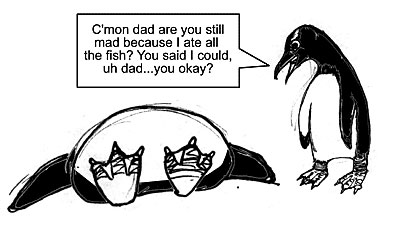


|
 |
|
|
Illustration by Arnie Bermudez
|
|
|
By Jill Holt
Arizona Daily Wildcat
Monday October 6, 2003
Things you always never wanted to know
Castor oil is used as a lubricant in jet planes.
In the history of printing, several early English Bibles are famous not so much for their workmanship or their beauty as for the textual idiosyncrasies. A few famous examples, much sought after by rare-Bible collectors, are:
- The Breeches Bible (1560): so named because it states that Adam and Eve "sewed fig tree leaves together and made themselves breeches."
- The Bug Bible (1551): so named because of an incorrect translation of a line in the 91st Psalm. The line, "Thou shalt not be afraid for the terror by night," reads, "Thou shalt not be afraid of any buggies by night."
- The Treacle Bible (1568) : so named because it used the word "treacle" for "balm" in the line, "Is there no balm in Gilead?"
The penguin has an apparatus above its eyes that enables it to transform salt water into fresh water. The penguin takes only one mate during its life and is such a conscientious parent that it will, if necessary, starve to death in order to provide its children with food.
When attacked, the petrel, a giant bird of the Antarctic, repels its enemies either by regurgitating food in their faces or by squirting a jet of viscous oil from its nostrils with a force great enough to knock down a person.
The men who served as guards along the Great Wall of China in the Middle Ages were often born on the wall, grew up there, married there, died there, and were buried within it. Many of these guards never left the wall in their entire lives.
The fingernails and the hair are dead. Both are made of a tissue called keratin, which is similar to the dried skin cells that continually flake off the body. Hair and nails, however, originate from living cells. Growth occurs at the base, and new cells push the dead hair and nails upward. Then these cells themselves die, to be pushed up and replaced by more from below.
Something to say? Discuss this on WildChat
Or write a Letter to the Editor
|
|

|
